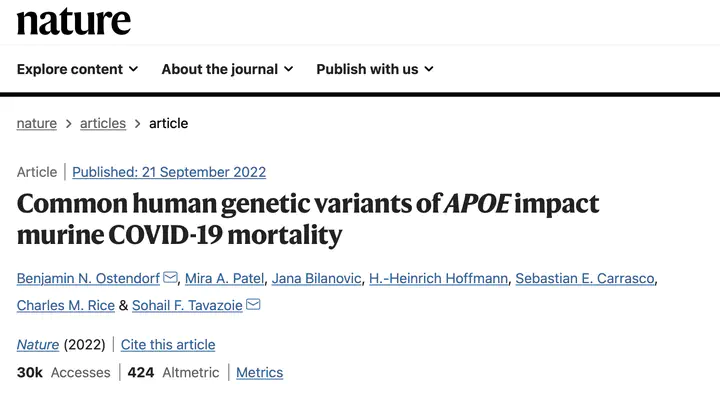Our paper on APOE in COVID-19 is published in Nature

We are over the moon that our paper on the role of APOE germline variants in COVID-19 is out in Nature !
We had just published our findings on the role of APOE variants in modulating anti-tumor immunity in melanoma when the COVID-19 pandemic hit hard. It quickly became apparent that outomes of individuals with COVID-19 were very heterogenous: while some remained completely asymptomatic, others developed critical or even fatal disease. Immune hyperactivation seemed to contribute to interindividual variability, but to this day it remains insufficiently understood why people with COVID-19 fare so differently. Given our findings in melanoma, we started wondering whether APOE might also play a role in modulating response to SARS-CoV-2 infection. Luckily, the lab of Ralph Baric derived a variant of SARS-CoV-2 that efficiently infected mice, and even more luckily, the lab of Charlie Rice produced and provided that virus for us to do in-vivo experiments. The differences between mice with different APOE alleles were striking: While all male APOE4 mice succumbed to SARS-CoV-2 infection, around 70% of male APOE3 mice survived. Using flow cytometry, bulk RNA-seq and single-cell RNAseq, we found that initial adaptive immune responses in APOE2 and APOE4 mice were blunted relative to APOE3 mice., with later antiviral immunity diverging between APOE2 and APOE4. Additionally, we found that APOE directly interfered with SARS-CoV-2 infection. These data indicate that APOE genotype impacts COVID-19 outcome through at least two mechanisms: Modulation of antiviral immunity and modulation of viral infection. Consistent with our mouse data, APOE genotype was significantly associated with survival in 13,000 COVID-19 patients of the UK Biobank. If you want to read more, either take a look at this tweetorial or the entire paper. Thank you to all co-authors for incredible teamwork, for all participants of the UK Biobank, and our funders for making this work possible!